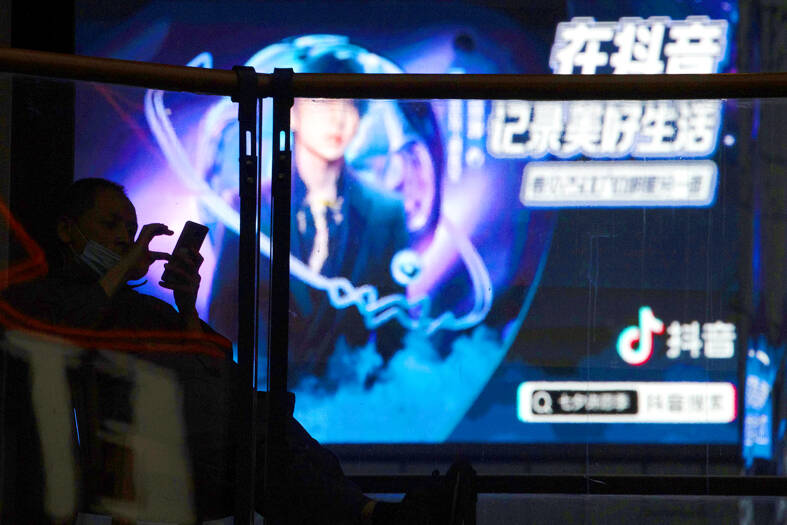Authorities should investigate whether ByteDance Taiwan is affiliated with Beijing-based ByteDance Ltd (字節跳動), which would show whether they are upholding the Act Governing Relations Between the People of the Taiwan Area and the Mainland Area (臺灣地區與大陸地區人民關係條例), the Mainland Affairs Council (MAC) said yesterday.
Article 73 of the act states that China-based social media software companies — which includes TikTok and its Chinese version, Douyin (抖音) — are prohibited from establishing branch offices in Taiwan, the council said on Thursday.
Tiktoktaiwan Co Ltd (昇洋國際生技), registered in 2019, on Nov. 2 changed its registered name to ByteDance Taiwan (字節跳動台灣), Ministry of Economic Affairs’ records show.

Photo: AP
The government’s lack of action contradicts its verbal commitment to reduce the influence of Chinese technology firms in Taiwan, Democratic Progressive Party (DPP) Legislator Chiu Chi-wei (邱志偉) said.
Chiu cited the example of an investigation into China-based streaming media service iQiyi (愛奇藝) that took two years before the Taiwanese representative terminated the contract.
TikTok poses a greater information and national security risk than iQiyi, Chiu said, pushing for an urgent government probe.
Taiwan Thinktank member Tung Li-wen (董立文) said the government should not allow software that poses a “great risk” to Taiwan, and phase out such software throughout Taiwan.
Tung said that enacting new legislation might require a long and complex process, but Taipei can use existing laws, such as the Consumer Protection Act (消費者保護法), or the Criminal Code, to begin controlling what content a platform delivers.
Association of Chinese Elite Leadership Secretary-General Wang Chih-sheng (王智盛) said TikTok’s security risk is well known, citing Indiana Attorney General Todd Rokita’s lawsuit against TikTok for misleading consumers about its age-appropriateness and its protections for shielding US user data from access by the Chinese government.
The US Senate passed a bill on Wednesday banning federal employees from using TikTok on government devices, and Taiwan should implement similar measures, Wang said.
Even if Taiwan cannot duplicate every restriction the US has enacted against TikTok, Taipei should be able to use creative methods to “take the fight head-on” with the company, he said.
Such efforts would provide examples for the international community to follow, he added.
The most pressing issue to investigate is how the company managed to enter Taiwan despite regulations, Wang said.

DAREDEVIL: Honnold said it had always been a dream of his to climb Taipei 101, while a Netflix producer said the skyscraper was ‘a real icon of this country’ US climber Alex Honnold yesterday took on Taiwan’s tallest building, becoming the first person to scale Taipei 101 without a rope, harness or safety net. Hundreds of spectators gathered at the base of the 101-story skyscraper to watch Honnold, 40, embark on his daredevil feat, which was also broadcast live on Netflix. Dressed in a red T-shirt and yellow custom-made climbing shoes, Honnold swiftly moved up the southeast face of the glass and steel building. At one point, he stepped onto a platform midway up to wave down at fans and onlookers who were taking photos. People watching from inside

A Vietnamese migrant worker yesterday won NT$12 million (US$379,627) on a Lunar New Year scratch card in Kaohsiung as part of Taiwan Lottery Co’s (台灣彩券) “NT$12 Million Grand Fortune” (1200萬大吉利) game. The man was the first top-prize winner of the new game launched on Jan. 6 to mark the Lunar New Year. Three Vietnamese migrant workers visited a Taiwan Lottery shop on Xinyue Street in Kaohsiung’s Gangshan District (崗山), a store representative said. The player bought multiple tickets and, after winning nothing, held the final lottery ticket in one hand and rubbed the store’s statue of the Maitreya Buddha’s belly with the other,

‘NATO-PLUS’: ‘Our strategic partners in the Indo-Pacific are facing increasing aggression by the Chinese Communist Party,’ US Representative Rob Wittman said The US House of Representatives on Monday released its version of the Consolidated Appropriations Act, which includes US$1.15 billion to support security cooperation with Taiwan. The omnibus act, covering US$1.2 trillion of spending, allocates US$1 billion for the Taiwan Security Cooperation Initiative, as well as US$150 million for the replacement of defense articles and reimbursement of defense services provided to Taiwan. The fund allocations were based on the US National Defense Authorization Act for fiscal 2026 that was passed by the US Congress last month and authorized up to US$1 billion to the US Defense Security Cooperation Agency in support of the

‘COMMITTED TO DETERRENCE’: Washington would stand by its allies, but it can only help as much as countries help themselves, Raymond Greene said The US is committed to deterrence in the first island chain, but it should not bear the burden alone, as “freedom is not free,” American Institute in Taiwan Director Raymond Greene said in a speech at the Institute for National Defense and Security Research’s “Strengthening Resilience: Defense as the Engine of Development” seminar in Taipei yesterday. In the speech, titled “Investing Together and a Secure and Prosperous Future,” Greene highlighted the contributions of US President Donald Trump’s administration to Taiwan’s defense efforts, including the establishment of supply chains for drones and autonomous systems, offers of security assistance and the expansion of